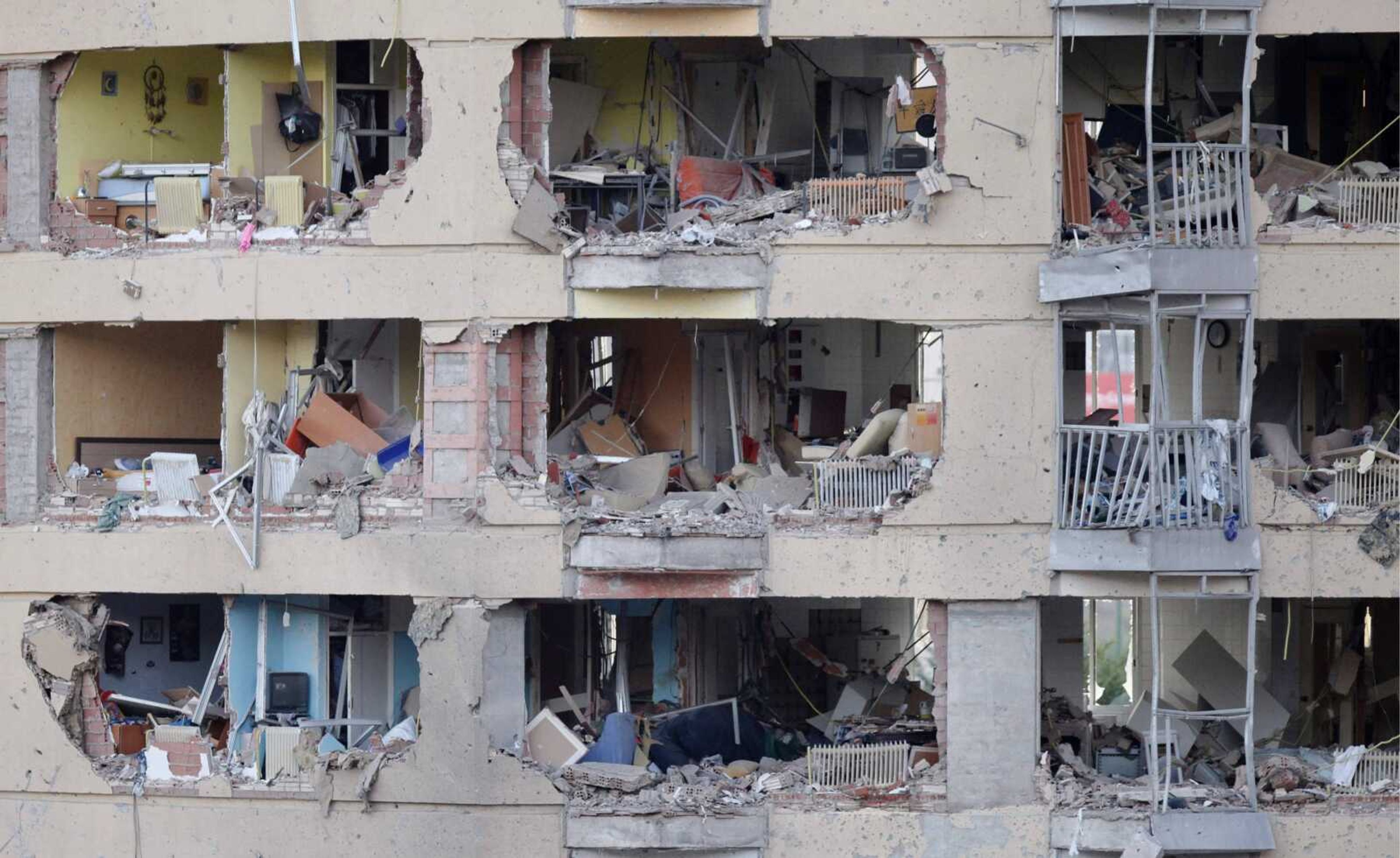Car bombing in Spain leaves 60 people injured; none killed
BURGOS, Spain -- The Basque separatist group's leader was nabbed in France as he slept late last year. His replacement lasted only a matter of weeks. Over the past couple of years, Spanish and French police have put most of ETA's leadership in jail, and with each arrest comes new claims the group has been decapitated...
BURGOS, Spain -- The Basque separatist group's leader was nabbed in France as he slept late last year. His replacement lasted only a matter of weeks. Over the past couple of years, Spanish and French police have put most of ETA's leadership in jail, and with each arrest comes new claims the group has been decapitated.
Yet nothing authorities do seems enough to kill the insurgency, which proved in Wednesday's massive car bombing that it is still a dangerous and sometimes lethal force.
The bomb -- 440 pounds of explosives -- did not kill anyone, but it shattered a 14-story barracks housing Spanish civil guard police and their families. The blast went off at 4 a.m., according to Interior Minister Alfredo Perez Rubalcaba. Sixty people were injured, mostly by flying glass.
The blast blew off much of the barracks' facade, left a deep crater that filled with water from broken underground pipes and hurled the van that carried the bomb about 230 feet. There was no warning beforehand and no attempt to give people inside time to evacuate.
"The attack aimed to cause deaths," Rubalcaba said after rushing to the scene. "After today, we know that we are dealing with murderers, savages and lunatics. That doesn't make them stronger, but it undoubtedly makes them more dangerous."
The explosion came days after Spain's El Mundo newspaper reported that Spanish authorities had received intelligence reports that three vans had been prepared as car bombs and were expected to cross into Spain from France. One of the vehicles mentioned was a Mercedes Vito, the same model that was used in the Burgos attack.
The attack occurred at a politically charged moment. The 50th anniversary of ETA's founding is Friday, and the group has a history of bombings during holidays or before Spain's economically important summer vacation period, which begins this weekend.
ETA -- founded in 1959 -- has killed more than 825 people since 1968, when it launched its violent campaign for an independent homeland in the Basque region of northern Spain and southwestern France. Its name is a Basque-language acronym for Basque Homeland and Freedom.
In its half-century of existence, ETA has outlasted every other major armed group in Europe, including the IRA in Northern Ireland, Italy's Red Brigades and Germany's Baader-Meinhof.
The Basque group has been hobbled by a wave of arrests since peace talks with the Spanish government collapsed in 2006, and since France stepped up cooperation following the killing of two Spanish police officers working on French soil last year.
ETA's top leader, Mikel de Garikoitz Aspiazu, was arrested in the French town of Cauterets on Nov. 17, along with a female ETA member. A few weeks later, his replacement, Aitzol Iriondo, was arrested in the French village of Gerde.
Rodolfo Ares, the head of the Basque region's Interior Ministry, told The Associated Press the arrests were taking a toll, and that ETA was losing some of its operational capacity.
"Every time we arrest these terrorists they are younger and younger," he said in a telephone interview. "They seem to have less training because the terrorist group needs to put them to work as soon as possible."
Politically, ETA also suffered a serious setback earlier this year when Basque voters for the first time chose a government allied with the ruling Socialists, rejecting a party that favored greater autonomy. Several parties closely allied with ETA were banned from taking part.
In early 2007, Spanish authorities told AP that they believed ETA had only about 15-20 "soldiers" left, supported by perhaps 100 more collaborators who would give them shelter and other logistical support.
Far more than that have been arrested since then -- 88 suspects nabbed in 2008 and another 55 so far this year, according to the Interior Ministry -- but still the attacks have continued.
There have been at least eight this year, the last on July 10 when a bomb exploded outside an office of the Spanish prime minister's party in the Basque town of Durango, causing significant damage but no injuries. The group's last fatal attack took place June 19, when a bomb attached to the underside of a car killed a Spanish police detective who investigated ETA.
Experts say the arrests have taken a toll, and that ETA will never be the same politically or militarily. But they say it is too soon to count ETA out.
"ETA is weakened, but it still has a lot of ability to do harm," Fernando Savater, a well-known Basque philosopher and the founder of an anti-ETA civic movement, told AP.
Juan Fernando Lopez Aguilar, Spain's former justice minister and the current president of the European Union's civil liberties commission, said ETA would never achieve its political objectives.
"Their only future is the dock of the accused, justice, conviction and jail," he said, though he warned that while the group had been weakened it would always prove attractive to disillusioned youths.
"No society is free or has immunity from the threat of organized crime and its capacity to attract members from the marginalized and socially excluded elements in society," he said.
------
Editor's Note: Israel Lopez reported from Burgos, Paul Haven from Madrid. Associated Press writers Ciaran Giles, Harold Heckle and Jorge Sainz contributed to this report.
Connect with the Southeast Missourian Newsroom:
For corrections to this story or other insights for the editor, click here. To submit a letter to the editor, click here. To learn about the Southeast Missourian’s AI Policy, click here.









